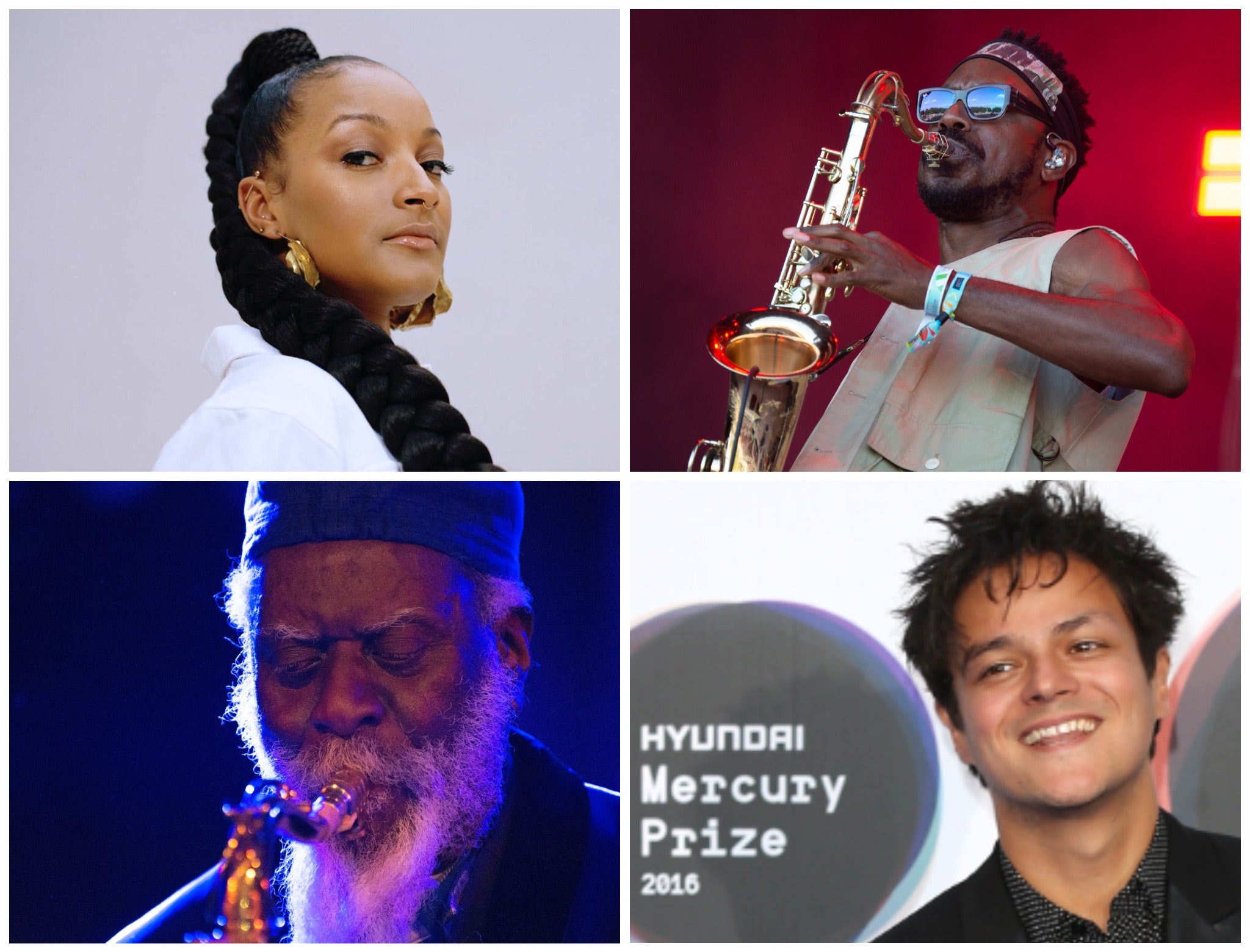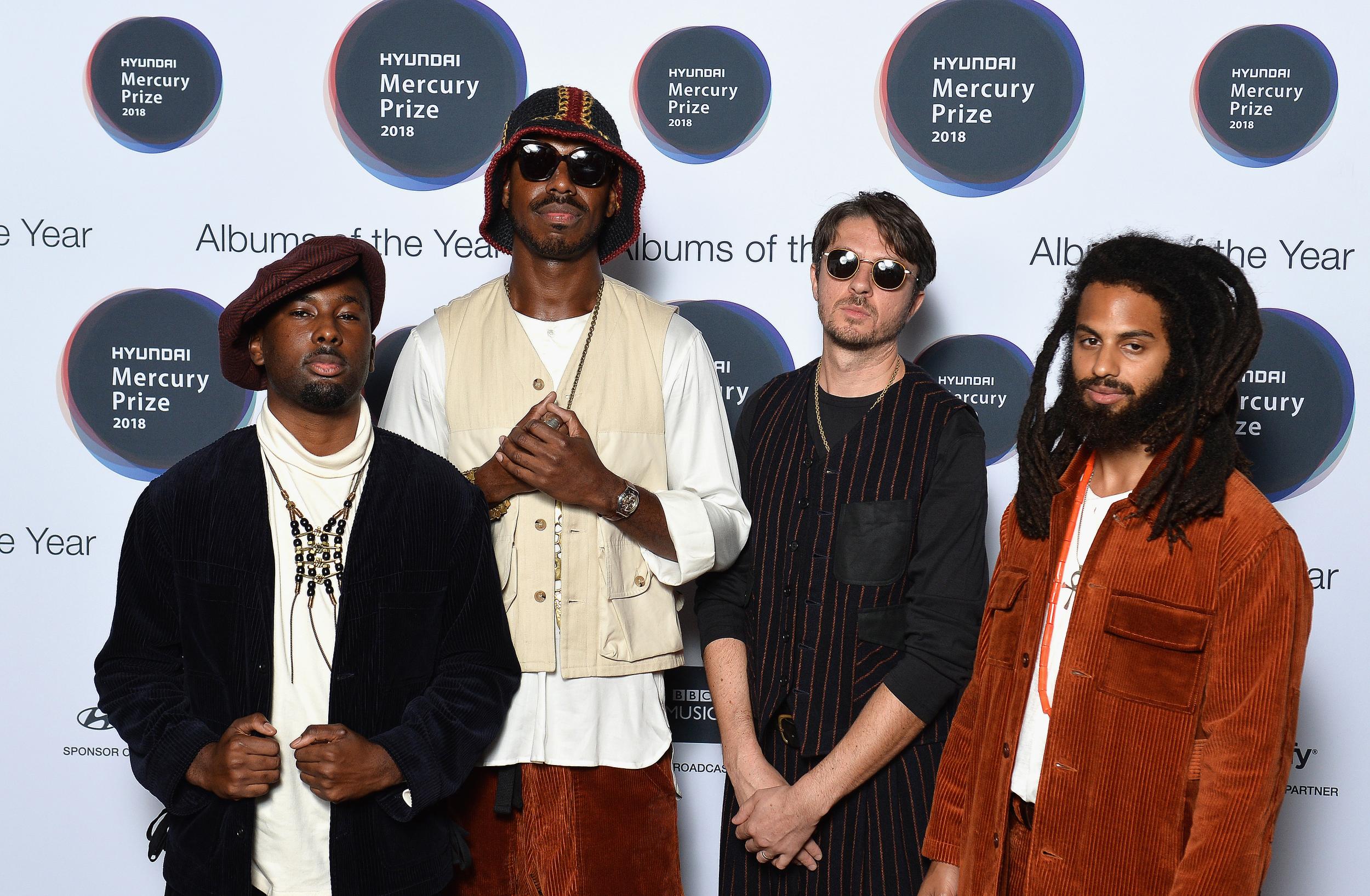Miles ahead: Why jazz could win big at this year’s Mercury Prize
Once the butt of the joke at the annual industry prize, saxophonists could finally be seen on a level with rockers and pop stars in 2021. Ahead of Thursday’s ceremony, judge Jamie Cullum and former nominee Seb Rochford tell John Lewis what’s changed

Your support helps us to tell the story
From reproductive rights to climate change to Big Tech, The Independent is on the ground when the story is developing. Whether it's investigating the financials of Elon Musk's pro-Trump PAC or producing our latest documentary, 'The A Word', which shines a light on the American women fighting for reproductive rights, we know how important it is to parse out the facts from the messaging.
At such a critical moment in US history, we need reporters on the ground. Your donation allows us to keep sending journalists to speak to both sides of the story.
The Independent is trusted by Americans across the entire political spectrum. And unlike many other quality news outlets, we choose not to lock Americans out of our reporting and analysis with paywalls. We believe quality journalism should be available to everyone, paid for by those who can afford it.
Your support makes all the difference.The curious stylistic diversity of the Mercury Prize – the British music industry’s award for the “best” album of the year – has become something of a joke over its 30-year history. “It’s kind of like a crazy contest between an orange and a spaceship and a potted plant and a spoon,” said Anohini of Antony & The Johnsons when accepting the Prize in 2005. “Which one do you like better? How can you possibly answer that question?”
One of the most common sources of hilarity, though, has been the persistent inclusion of “the token jazz album” on the shortlist of 12 albums. Strictly speaking, a jazz album has not yet won the award. But, as the British jazz scene has started to reassert itself in the musical firmament over the past decade, albums by the likes of Shabaka Hutchings and Moses Boyd don’t seem particularly marginal anymore, and few observers will be questioning the jazz entries on the 2021 shortlist.
The Mercury Prize has always been a competition between quite distinct forms of music – a place where indie rock finds itself competing with hip-hop, folk, house, electronica, prog-metal and straight-down-the-line pop. The 12 albums on the 2021 shortlist seem to be even more varied than usual, with a classical string arranger (Hannah Peel), a Trinidad-born rapper (Berwyn), an east London grime MC (Ghetts), an Anglo-American soul singer (Celeste) and a mysterious London R&B collective (Sault) all in the mix. And the list features at least two acts that might come under the broad umbrella of “jazz” – legendary American astral jazz saxophonist Pharoah Sanders, collaborating with British electronica producer Floating Points alongside the London Symphony Orchestra, and tenorist Nubya Garcia (fronting her Londoncentric quartet).
“It’s always good to see a broad range of music being represented in the Prize,” says Jamie Cullum, the musician and BBC Radio 2 DJ who has been one of the 12 Mercury judging panel for the last four years – which means he has spent much of the last four months ploughing through more than 300 nominated albums. “Even when I was a punter I quite liked hearing the Mercury shortlist – it reminded you of great albums and introduced you to lots of stuff you might not have heard. And, for those who are surprised that jazz gets included so frequently, it might be because a lot of folks on the panel, including musicians and DJs, listen to jazz and have a particular interest in the music coming out of London’s fertile jazz scene right now.”
Since its launch in 1992, the Mercury Prize has always made an effort to include artists from genres outside of the pop sphere, but it often came across as slightly clumsy and tokenistic – like a giant pineapple being presented at a Prize marrow competition. In its earliest years, the shortlist regularly included new orchestral composers such as John Taverner, Gavin Bryars, Michael Nyman, James MacMillan, Peter Maxwell Davies and Mark-Anthony Turnage. For many years there were also regular shortlisted slots for prominent figures in the world of traditional music, including Norma Waterson, Kate Rusby, Kathryn Williams and Seth Lakeman, which led to the twice-shortlisted Eliza Carthy describing herself as the “token folkie” at the 2003 award ceremony.
While the contemporary classical and folk acts seem to have dropped out from the Mercury Prize in recent years, jazz seems to have stubbornly held a place on the shortlist for nearly every one of the 30 years of the Prize. In its first few years, the Mercury would feature venerable figures on the London jazz scene – including Stan Tracey, John Surman, Bheki Mseleku, Guy Barker and Courtney Pine – with a slot on the shortlist serving as a kind of lifetime achievement award.
But, by the early 2000s, the Prize started to reflect a new generation of jazz musicians. Soweto Kinch’s 2003 debut LP, Conversations With The Unseen, appeared to kickstart a new generation of British jazz, and was followed by a slew of albums made by twentysomething musicians who were weaving jazz into a tapestry of music that included hip-hop, soul, post-rock, minimalism and rave. The Mercury started to shortlist bands like Polar Bear, Portico Quartet, Led Bib, Roller Trio, Kit Downes Trio and GoGo Penguin – all jazz-rooted acts who were more comfortable playing at rock venues than jazz clubs and looked more like indie bands.
“As a jazz artist, you tend not to experience the media attention associated with the Mercury Prize,” says Seb Rochford, drummer and leader of Polar Bear. “The first time Polar Bear were nominated in 2005, I remember being absolutely shell shocked by the red carpet, by the photographers, by the members of the press asking you tons of questions. You’re just not used to that, coming from the jazz world!”
Rochford had since been nominated several more times – once more for Polar Bear in 2014, once as the guest drummer with Basquiat Strings in 2007 and several times as the drummer on albums by Corinne Bailey Rae, Adele and Sons Of Kemet – which means he’s probably received more Mercury nominations than any other artist. “I think, 20 years ago, people were very sniffy about the jazz acts on the shortlist,” he says. “You were an anomaly. People would moan that you were taking up a slot that should have been occupied by a rock band. I think it’s different now. Jazz is no longer seen as something hopelessly marginal – people like Shabaka Hutchings and Nubya Garcia are changing how jazz is viewed by the general public.”
The Mercury also gives jazz musicians exposure in front of a large, live BBC television audience, and a chance to steal the show. One recalls Shabaka Hutchings, resplendent in a sequinned Union Jack beanie hat, receiving a standing ovation after his rabble-rousing performance with Sons Of Kemet in 2018. “I knew that we could own the room with sheer rhythm and volume,” says Hutchings, with a grin. “It was a chance to shine on live TV!”

Or there was pianist Zoe Rahman earning the gushing praise of Matt Bellamy from Muse after her 2006 slot. “He said that they might as well give the award to me after that performance,” says Rahman, with a laugh. “That was quite an accolade! But getting a Mercury nomination does open doors. It gets you noticed. You get more offers to guests with musicians of all genres, you are put on the radar of fixers who put together touring bands. You get offered better slots at festivals and big venues.”
It can be argued that the Mercurys are fighting to stay relevant in an age where streaming has devalued the currency of the album as an artistic form. However, it’s also true that the Prize is a much more open and level playing field than ever before. In a world where new rock bands no longer have hit singles – and rarely have hit albums – most of the music in the Mercury Prize can be considered “marginal” in some way. Indeed, many British jazz acts find themselves being playlisted on 6Music or 1Xtra – including recent Mercury nominees The Comet Is Coming, Sons Of Kemet, Moses Boyd, Nubya Garcia and Seed Ensemble. And these aren’t outliers. Even within the time period for the 2021 award, there are plenty of jazz albums – including Emma Jean Thackray’s rave-fuelled Yellow, pianist Alfa Mist’s Bring Backs and Sons Of Kemet’s Black To The Future – which could be considered unlucky not to make the cut.
“British jazz has always had a vitality, but it feels much more plugged into the broader music scene more than at any time in recent history,” says Cullum. “When I was in the charts, 15 or 20 years ago, jazz was classified as part of easy listening or MOR, which I have no problem with. But there’s something very different about the new generation of jazz musicians. It seems a lot more reflective of contemporary culture – it’s very diverse, there are many women involved, and it’s music that often works on the dancefloor.”
Cullum says that it speaks to today’s musical adventurousness. “People aren’t forced into listening to music in a certain way – young people who make music are taking their influences from lots of leftfield sources,” he continues. “A lot of the acts on this shortlist are artists who’ve been championed by leftfield DJs and online radio stations like NTS, Rinse, Worldwide FM or Soho Radio. Indeed, you’re likely to hear most of the acts shortlisted this year – including Sault, Celeste, Laura Mvula, Nubya Garcia, Floating Points and Pharoah Sanders, even Hannah Peel – all being played on Gilles Peterson’s 6Music show.”

Partly this is because a lot of the music being made by British jazz musicians at the moment is converging with a lot of contemporary R&B and dance music. Indeed, many musicians who have appeared on recent Mercury shortlists, including Laura Mvula and the 2020 winner Michael Kiwanuka, are trained jazz musicians who studied at music colleges, while other acts on this year’s shortlist (including R&B singer Celeste and London soul and funk collective Sault, led by producer Inflo and singer Cleo Sol) have strong links with the London jazz scene. “Jazz is much more part of the conversation,” agrees Rochford, pointing to Promises as a prime example of different worlds converging. “Look at the Floating Points/Pharoah Sanders album on this year’s shortlist – it’s obviously got a jazz element, but it’s as much of an electronica album, with a huge orchestra.”
“The Floating Points album doesn’t fit into any box,” agrees Cullum. “It’s even beyond music – it’s a unique piece of performance art that feels more like an art installation or something! But, in some ways, that seems to represent 2021 more than anything else.” Indeed, it wouldn’t be an enormous shock to see one of the so-called “token” jazz albums actually winning the Prize this year.
The winner of the Mercury Prize will be announced on 9 September at the Hammersmith Apollo. John Lewis is a music critic and former judge on the Mercury Prize



Join our commenting forum
Join thought-provoking conversations, follow other Independent readers and see their replies
Comments